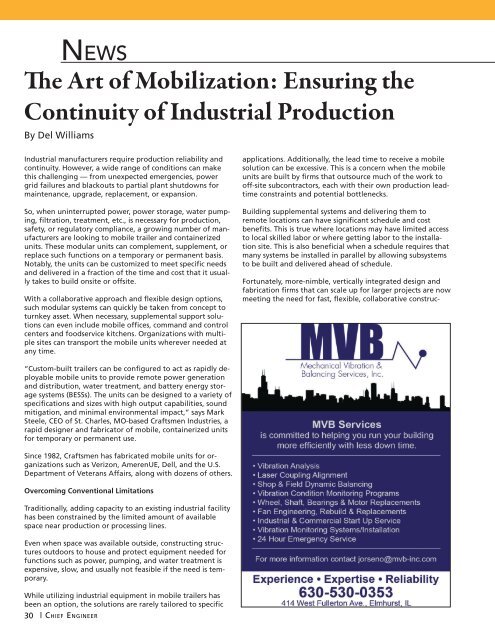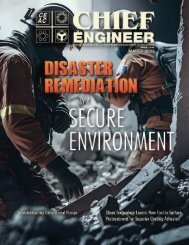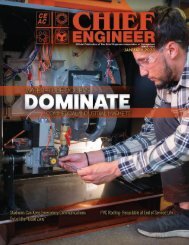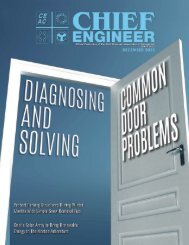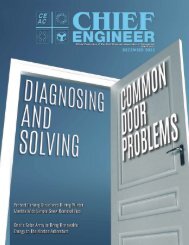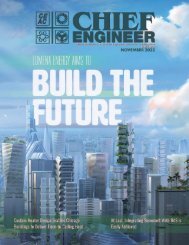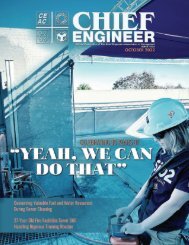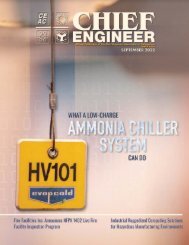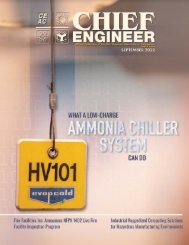CEAC-2021-02-February
You also want an ePaper? Increase the reach of your titles
YUMPU automatically turns print PDFs into web optimized ePapers that Google loves.
News<br />
The Art of Mobilization: Ensuring the<br />
Continuity of Industrial Production<br />
By Del Williams<br />
Industrial manufacturers require production reliability and<br />
continuity. However, a wide range of conditions can make<br />
this challenging — from unexpected emergencies, power<br />
grid failures and blackouts to partial plant shutdowns for<br />
maintenance, upgrade, replacement, or expansion.<br />
So, when uninterrupted power, power storage, water pumping,<br />
filtration, treatment, etc., is necessary for production,<br />
safety, or regulatory compliance, a growing number of manufacturers<br />
are looking to mobile trailer and containerized<br />
units. These modular units can complement, supplement, or<br />
replace such functions on a temporary or permanent basis.<br />
Notably, the units can be customized to meet specific needs<br />
and delivered in a fraction of the time and cost that it usually<br />
takes to build onsite or offsite.<br />
With a collaborative approach and flexible design options,<br />
such modular systems can quickly be taken from concept to<br />
turnkey asset. When necessary, supplemental support solutions<br />
can even include mobile offices, command and control<br />
centers and foodservice kitchens. Organizations with multiple<br />
sites can transport the mobile units wherever needed at<br />
any time.<br />
applications. Additionally, the lead time to receive a mobile<br />
solution can be excessive. This is a concern when the mobile<br />
units are built by firms that outsource much of the work to<br />
off-site subcontractors, each with their own production leadtime<br />
constraints and potential bottlenecks.<br />
Building supplemental systems and delivering them to<br />
remote locations can have significant schedule and cost<br />
benefits. This is true where locations may have limited access<br />
to local skilled labor or where getting labor to the installation<br />
site. This is also beneficial when a schedule requires that<br />
many systems be installed in parallel by allowing subsystems<br />
to be built and delivered ahead of schedule.<br />
Fortunately, more-nimble, vertically integrated design and<br />
fabrication firms that can scale up for larger projects are now<br />
meeting the need for fast, flexible, collaborative construc-<br />
“Custom-built trailers can be configured to act as rapidly deployable<br />
mobile units to provide remote power generation<br />
and distribution, water treatment, and battery energy storage<br />
systems (BESSs). The units can be designed to a variety of<br />
specifications and sizes with high output capabilities, sound<br />
mitigation, and minimal environmental impact,” says Mark<br />
Steele, CEO of St. Charles, MO-based Craftsmen Industries, a<br />
rapid designer and fabricator of mobile, containerized units<br />
for temporary or permanent use.<br />
Since 1982, Craftsmen has fabricated mobile units for organizations<br />
such as Verizon, AmerenUE, Dell, and the U.S.<br />
Department of Veterans Affairs, along with dozens of others.<br />
Overcoming Conventional Limitations<br />
Traditionally, adding capacity to an existing industrial facility<br />
has been constrained by the limited amount of available<br />
space near production or processing lines.<br />
Even when space was available outside, constructing structures<br />
outdoors to house and protect equipment needed for<br />
functions such as power, pumping, and water treatment is<br />
expensive, slow, and usually not feasible if the need is temporary.<br />
While utilizing industrial equipment in mobile trailers has<br />
been an option, the solutions are rarely tailored to specific<br />
30 | Chief Engineer


